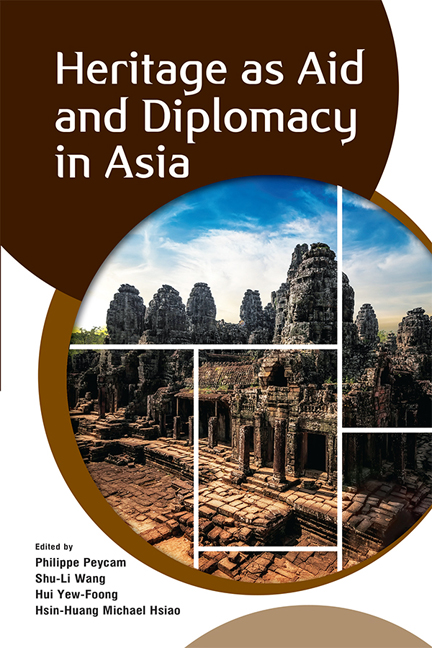Book contents
- Frontmatter
- Contents
- Contributors
- 1 Heritage as Aid and Diplomacy in Asia: An Introduction
- 2 World Heritage and WikiLeaks: Territory, Trade and Temples on the Thai-Cambodian Border
- 3 Heritage Making – Aid For Whom? The Genealogy of Expert Reports in the Hands of Politics and Their Impact in the Case of Preah Vihear
- 4 The International Coordinating Committee for Angkor: A World Heritage Site as an Arena of Competition, Connivance and State(s) Legitimation
- 5 Legacies of Cultural Philanthropy in Asia
- 6 To Help or Make Chaos? An Ethnography of Dutch Expertise in Postcolonial Indonesia
- 7 Heritage Conservation as a Tool for Cultural Diplomacy: Implications for the Sino-Japanese Relationship
- 8 From Ideological Alliance to Identity Clash: The Historical Origin of the Sino-Korean Goguryeo Controversies
- 9 Nationalism, Politics and the Practice of Archaeology in Afghanistan: A Case Study of Bamiyan
- 10 Disappearing Voices: The Politics and Practice of Safeguarding Kunqu Opera in the People’s Republic of China
- 11 Neoliberalizing Heritage: International Agencies and the Local Dynamics of Heritage Conservation in Bali, Indonesia
- 12 Heritage Conservation as Trickle-Down Development
- Index
9 - Nationalism, Politics and the Practice of Archaeology in Afghanistan: A Case Study of Bamiyan
Published online by Cambridge University Press: 10 November 2020
- Frontmatter
- Contents
- Contributors
- 1 Heritage as Aid and Diplomacy in Asia: An Introduction
- 2 World Heritage and WikiLeaks: Territory, Trade and Temples on the Thai-Cambodian Border
- 3 Heritage Making – Aid For Whom? The Genealogy of Expert Reports in the Hands of Politics and Their Impact in the Case of Preah Vihear
- 4 The International Coordinating Committee for Angkor: A World Heritage Site as an Arena of Competition, Connivance and State(s) Legitimation
- 5 Legacies of Cultural Philanthropy in Asia
- 6 To Help or Make Chaos? An Ethnography of Dutch Expertise in Postcolonial Indonesia
- 7 Heritage Conservation as a Tool for Cultural Diplomacy: Implications for the Sino-Japanese Relationship
- 8 From Ideological Alliance to Identity Clash: The Historical Origin of the Sino-Korean Goguryeo Controversies
- 9 Nationalism, Politics and the Practice of Archaeology in Afghanistan: A Case Study of Bamiyan
- 10 Disappearing Voices: The Politics and Practice of Safeguarding Kunqu Opera in the People’s Republic of China
- 11 Neoliberalizing Heritage: International Agencies and the Local Dynamics of Heritage Conservation in Bali, Indonesia
- 12 Heritage Conservation as Trickle-Down Development
- Index
Summary
In 2001 the Taliban destroyed the Buddhas of Bamiyan, two of the world's tallest Buddha statues, which had stood at the crossroads of Asia for more than 1,400 years. The event was a poignant example of the dynamic relationship between archaeological heritage and politics. In the aftermath, the international community largely attributed the event to a growing trend of heritage destruction (i.e., Bahadur 2002; Bryant 2002) perpetrated by religious fundamentalists across South Asia (i.e., Chakrabarti 2003; Coningham and Lewer 1999; Ratnagar 2004). Others placed the event within a continuance of Islamic iconoclasm, extending back to the medieval period, across the broader Muslim world. From 2014, the Bamiyan Buddhas’ destruction was reinterpreted as a harbinger for Da’esh's iconoclastic destruction of archaeological sites across the Middle East (Williams 2015).
While the destruction of the Buddha statues linked the threats posed by religious fundamentalism to eastern and western neighbours, within Afghanistan it also underscored the relationship between the country's archaeology, nationalism and politics. Since Afghanistan's “independence” in the early twentieth century, successive political leaders have attempted to build a nation from a deeply divided society, and one of the most valuable resources available has been the ancient archaeological heritage. While numerous studies have revealed the politicization of archaeological heritage in the twentieth and twenty-first centuries across the Middle East and South Asia (i.e., Goode 2007; Meskell 1997; Silberman 1989), none have fully delved into the twentieth-century historical backdrop that shaped the events of 2001 in Afghanistan. Moving beyond the typically generalized treatment of the Taliban and their destruction of the Buddhas (for a discussion, see Bernbeck 2010, p. 30), this paper aims to place the events of 2001 in the context of the formation and development of nationalism and the archaeological discipline in Afghanistan since the country's “independence” in 1919. Using the iconic case of Bamiyan, this paper will reveal how key actors, including foreign archaeologists, conservative religious groups and Afghan political administrations, shaped the politicization of archaeology in the modern Afghan nation-state.
- Type
- Chapter
- Information
- Heritage as Aid and Diplomacy in Asia , pp. 226 - 253Publisher: ISEAS–Yusof Ishak InstitutePrint publication year: 2020

